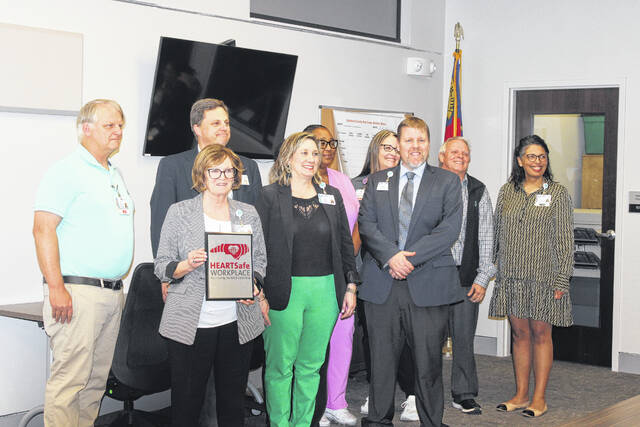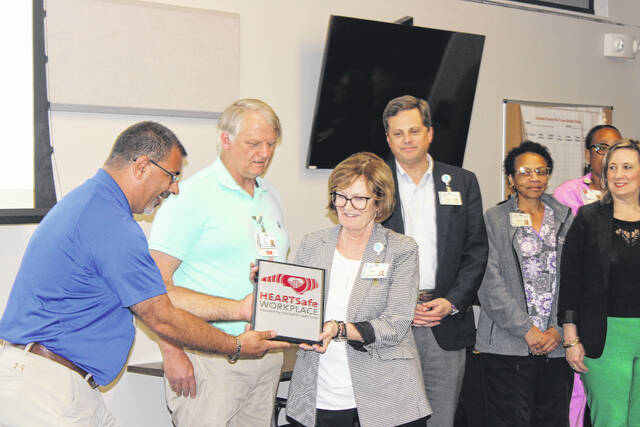LAURINBURG — On Jan. 2, 2023, millions watched live as Damar Hamlin, a professional football player for the Buffalo Bills, went into cardiac arrest mid-game.
Shortly thereafter, Hamlin received immediate medical attention. It’s that type of response that is sought for communities throughout North Carolina through the RAndomized Cluster Evaluation of Cardiac ARrest Systems (RACE-CARS) Trial initiative.
The RACE-CARS Trial aims to improve outcomes for out-of-hospital cardiac arrest (OHCA) victims. A cardiac arrest occurs when the heart either stops or has an irregular heartbeat. The RACE-CARS Trial is led by a team of researchers at the Duke Clinical Research Institute in partnership with participating EMS agencies, hospitals, 911-dispatch, fire, rescue, law enforcement agencies, and communities throughout North Carolina.
“We’re proud to participate in this survey and hopefully its going to make a big difference in the state of North Carolina,” said Matt Locklear, assistant director of Scotland County’s EMS.
Scotland Health Care System is on the right track to accomplishing this feat. This week, they were recognized as a Heart Safe Workplace at the Emergency Operations Center in Laurinburg during the annual meeting of RACE-CARS, which included representatives from churches, businesses, public safety, health care and the Scotland County Schools district. The award is given when a business or organization trains all of its nonclinical staff in hands-only CPR.
“The goal is to have everyone trained so that no matter what happens, if there is a cardiac arrest event within your business, there will be somebody trained to recognize and begin CPR immediately,” said Robert Sampson, Scotland County’s Public Safety director.
Scotland Health, one of Scotland County’s largest employers, is one of the first organizations not only in Scotland County, but in the state, to reach the milestone, according to Sampson. During this meeting Scotland Health was recognized and presented a plaque for the accomplishment.
There were 252 community members who received hands-on CPR training through Scotland Health Care System and initiatives led by Mike Frease, nurse educator and Latoscha Campbell, director of the emergency center, in 2024, according to Bebe Holt, vice president of Patient Care Services and chief nursing officer at Scotland Health Care System.
“In addition to that, there were 72 of our very own health care workers either in EDs or whatever department that received hands-on training. We’re very proud that we have AEDs throughout the hospital now. I’d like to recognize and thank our foundation, Scotland Memorial Foundation, for supporting that initiative to put those AEDs throughout the facility,” Holt said.
AEDs, Automated external defibrillators (AEDs) are portable, life-saving devices designed to treat people experiencing sudden cardiac arrest, a medical condition in which the heart stops beating suddenly and unexpectedly. According to the U.S. Food and Drug Administration, the combination of CPR and early defibrillation is effective in saving lives when used in the first few minutes following a collapse from sudden cardiac arrest.
Locklear said that since he has been in Scotland County, they have been able to add 40 AEDs to public areas. These areas include public parks and even at McDuffie Square.
“Anywhere that we’re going to have a large group of people at any given time, we want to make sure that we’ve got access to AEDs and somebody that has CPR certification,” Locklear said.
Also during the meeting, attendees heard statistics from Samantha Dutch, Scotland County’s Emergency Communications director and Locklear and what each of their departments are doing to better respond to cardiac arrests.
Dutch said that some of the goals moving forward are improving CPR recognition rates, enhancing telecommunication training, reducing call-to-call compression time, participating in public awareness campaigns, increasing community CPR training and sharing data and feedback.
Locklear also said his department can work on ensuring more accurate identification of who started CPR, assuring first responders and community training addresses the timeliness of AED application and use, and holding survivor celebrations to acknowledge successes.
Tomeka Sinclair can be reached at [email protected] or 910-506-3169.


